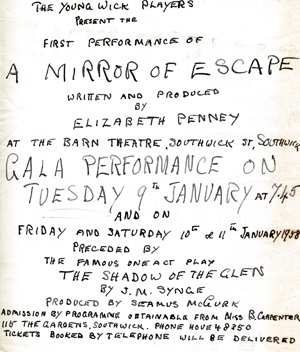Review #1: The Shadow of the Glen
Publication: Unknown
Publication Data: Unknown
Reviewer: Unknown
Text Header: None
Text: Content
The performance [of Mirror ..] was preceded by an Irish curtain raiser – J. M. Synge’s The Shadow of the Glen delightfully acted by Jean Porter, Patrick Johnson, Joe Mohan and Seamus McGurk, complete with authentic Irish accents. The production – quite a little gem in its way – puts a feather in the cap of young Mr. McGurk and makes an attractive beginning to the programme, which will be presented for a third evening.
Comment #1: A Mirror of Escape
This premiere performance all came to pass when the Young Wick Players realised that the pantomime Sleeping Beauty they had prepared would clash with similar shows to be staged in the district. And so at the last minute their plans were changed.
“So they just came along and grabbed a play I had written with the idea of selling it to television” said their President Mrs. Elizabeth Penney.
“The funny thing is that the Brighton pantomime wasn’t the same as the one they had planned to do, anyway. I hadn’t even had time to get down and finish it off properly when the players decided they wanted to do it.” Mrs. Penney added, “This will give me a good idea of how people like it.”
The took only three weeks to write but a year of intense thought and ‘mental sketching’ went into it before she put pen to paper. “I like to get everything cut and dried in my mind before I write a word,” she said, “I can’t just blunder along waiting for inspiration.”
Review #1: A Mirror of Escape
Publication: Shoreham Herald
Publication Data: January 10 1958 issue – page 3
Reviewer: Unknown
Text Header: “‘A Mirror of Escape’ lacked conviction”
Text: Content
IT was enterprising of the Young Wick Players to put on a brand new play for their winter production in the Barn Theatre, Southwick last week, but one regrets that the play itself – Elizabeth Penney’s A Mirror of Escape was such a novelettish affair. Despite the snatch of rock ‘n’ roll, the ‘arty’ characters and the occasional pointed comment on modern society – “everything’s got to be loud, violent or sexy” – it was a curiously old fashioned piece, leaning heavily on that hoariest of stage clichés – loss of memory. The principal characters are a writer and his wife. The latter, it appears, is a model with the face of a Madonna. Sudden success causes her husband to neglect her, and she disappears in Spain. Then, one stormy night five years later, in she walks, not remembering a thing.
Irrelevancies
Even this creaking plot might have succeeded if there had been more emotional conviction in the writing, more intensity, more insight into the minds and feelings of gifted but temperamental people. But Mrs. Penney cluttered up her play with irrelevancies and weighed it down with pseudo-literary philosophising which obscured rather than illuminating the real issues.
The play does not begin to come alive until the arrival of the nuns to tell the writer of his wife’s suspected death – halfway through the second act. The authoress has also seen fit to burden it with a prologue and an epilogue set in a storm bound hut. The best part of the play, strangely enough, is the first act bottle party, which has some amusing and tart dialogue, and suggests that Mrs. Penney might do well to turn her attention to sophisticated comedy.
Consolation
Considering the play’s deficiencies, it is not surprising that the cast make heavy weather of it on the first night. Lines like “This is no time for the niceties of reticence” would have defeated anyone! There was consolation, however, in Mary Gedge’s notably sympathetic heroine, and sharp sketches of two Awful Young Things of the coffee-bar age by Patricia Holloway and Peggy Cook. Of the others, Adrian Hedges plodded dourly through the rôle of the conscience stricken writer, Ralph Dawes gave an earnest but rather colourless performance as his best friend, and Frances Moulton resisted the temptation to caricature the inevitable jolly landlady.
Mrs. Penney produced the play.
As a curtain-raiser we were given a lively and idiomatic performance of J. M. Synge’s one-act The Shadow of the Glen. Seamus McGurk produced and played the leading rôle of the poetic tramp, and in both capacities brought the authentic Irish flavour to the piece.
Coun. and Mrs. W. G. Field attended the gala ‘first night’.
Review #2: A Mirror of Escape
Publication: Brighton & Hove Gazette
Publication Data: Unknown
Reviewer: THALIA
Text Header: “NEW PLAY”
Text: Content
A WORKABLE idea is evident in Elizabeth Penney’s new play, A Mirror of Escape, presented by the Young Wick Players at Southwick Barn Theatre this week. As a story it could be read and pondered, but in its present form it is not good theatre … too much unlikely, unreal dialogue, and several loose ends. It was also bound to suffer – as so many plays would – from comparison with its curtain-raiser. This is J. M Synge’s The Shadow of the Glen, and most pleasing is the sensitivity of the cast to the poetry and rhythm of Synge’s phrasing. Jean Porter gives colour and finish to her picture of the young wife of old Dan Burke, an extremely good character by Patrick Johnson. Seamus McGurk, who also produced, is the tramp, and Joe Mohan the young shepherd.
A Mirror of Escape opens with a prologue showing a group of people marooned during a bad storm. All are unnerved and for distraction one tells a story which is enacted. Emotional conflict between husband and wife, both artists, the wife’s amnesia and disappearance after the birth of twins and her return after six years – still amnesic – appears to be the main thread of the play and there is an epilogue to reveal the suspected finale.
Within the limitations of the material, production – by the author – and acting aims at conviction. Mary Gedge and Adrian Hedges are the husband and wife and also in the cast of 14 are Betty Carpenter, Ralph Dawes and Frances Moulton.





